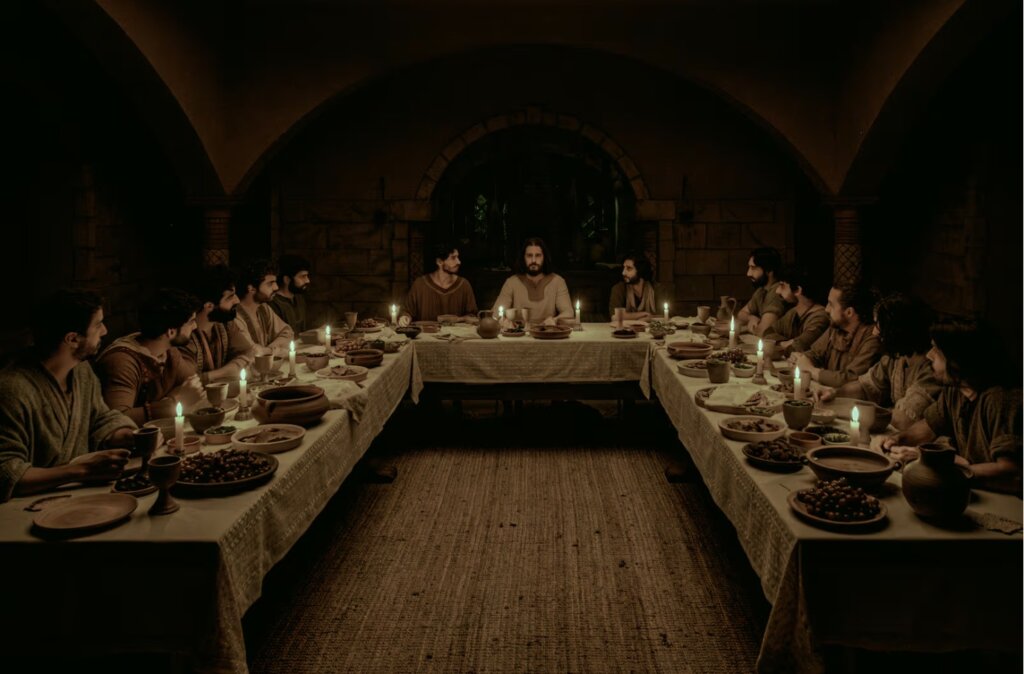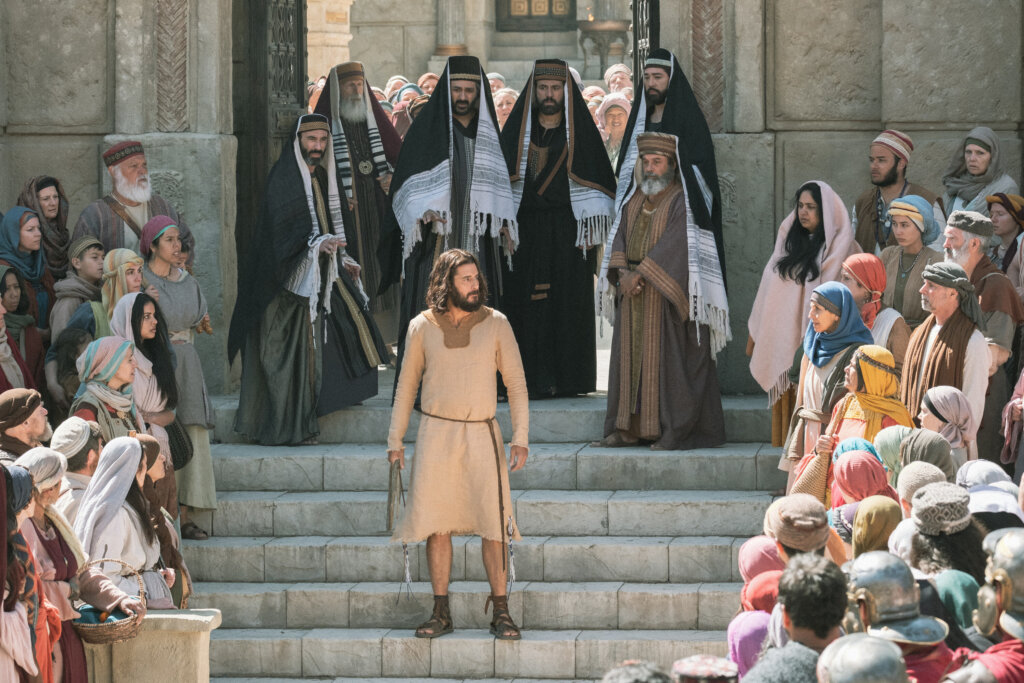The only good Jews in this hit Christian TV show are the ones who follow Jesus
‘The Chosen’ has long been obsessed with Jewish practice — but Jewish people don’t come off well in its retelling
“What is Passover and how do we celebrate it?” a gentile asks the apostles in The Chosen, the blockbuster TV show about Jesus and his disciples.
The question, of course, is asked for the benefit of the show’s Christian audience. The fifth season, releasing in three parts theatrically, is focused on the Last Supper; its opening weekend box office receipts put it in the top 10. And since The Chosen has long been obsessed with Jesus’ Judaism — in seasons past, we saw Jesus observing Shabbat, the disciples discussing mikvah law and even characters referencing Rabbi Hillel and the beit midrash — much of the show is devoted to the intricacies of Passover observance in Jesus’ time. Even its three-part theatrical release is timed to Passover; it won’t be released on its usual streaming services for several more months.
Each episode opens with the disciples sitting around a table with Jesus, eating matzo and maror, singing psalms and, of course, talking about how Jesus is the fulfillment of the Passover promise, as is traditional in Christian Seders. (One disciple even adds a verse to the Dayenu prayer, saying: “If he had built the Temple but not sent the messiah within our lifetimes, it would have been enough.”)
But of course, in Christian scripture, Passover is intricately bound up with Jesus’ crucifixion. And that’s dangerous territory for the Jews. Christian tradition has blamed Jews for Jesus’ death, leading to centuries of persecution and antisemitism. What is a show enraptured with Jewishness to do about the Jews?

Up until now, The Chosen has treaded carefully around Jesus’ relationship to the Jewish establishment of his time; they highlighted his Jewish identity even as they clearly differentiated his teachings — spiritual, fun, extemporaneous — from the Pharisees’ adherence to religious law and ritual observance. When I interviewed the show’s writers several years ago, they emphasized that they were going to great lengths to avoid implying that Jews were responsible for Jesus’ death and that they wanted to make it clear that it was Rome that killed Jesus, not the Jews.
Perhaps that’s why the season spends so much energy detailing the pressures of festival week in Jerusalem, including the mincing Roman authorities who keep the high priest’s sacred breastplate locked up. We see Pontius Pilate dangle the Temple garb before the priest, demanding he make a lot of tax revenue on the Passover celebration or else lose access to the Temple. We see Roman guards cheerfully slurp oysters in the priests’ faces. (“I enjoy that they’re forbidden,” one says). We see the Pharisees’ derision for King Herod’s hellenization. There was a lot of pressure on the Pharisees!
Still, given the outlines of a story that everyone already knows, there’s only so much you can do. Some of the most famous beats of Jesus’ story — overturning the money changers tables in the Temple courtyard, criticizing the Pharisees’ Jewish practices, invalidating religious law — set up a clear us vs. them paradigm.
The fact is that Jews can’t, really, look good in a Christian story. There is no Christianity without the belief that Jesus fulfilled Jewish prophecy, and his teachings superseded Jewish practices. It follows that anyone who didn’t believe in his messianic promise must have been closed-minded or blinded by corruption.
Still, perhaps thanks to the writers’ efforts to avoid antisemitism, there’s room to empathize with the traitorous Jewish characters. If you’re primed to view Jesus’ increasingly abrupt emotional swings and ramblings about his own death and divinity as profound, you will; I’m not, so I was reminded of some of the yoga bros I dated in my 20s who put a lot of effort into appearing enlightened. (Though, of course, as the story goes, Jesus did some more compelling things than stare into the middle distance with a spiritual mien — raising Lazarus from the dead, turning water into wine, etc.)
When a Pharisee tells Jesus that “You’re riding a donkey — to those of us who know prophecy your meaning couldn’t be any clearer,” I know we’re meant to understand that Jesus is the foretold messiah, but to me, it felt more like an example of how easy it is to fake a prophecy’s fulfillment.
By the time Judas has begun to doubt Jesus, and consider turning him in, I was with him. The apostle complains that Jesus promised to unite the people, but is, in fact, dividing everyone, causing violence and endorsing Rome’s rule. And Judas has a point!
Perhaps the problem with the story of the Last Supper and the crucifixion isn’t the idea that Jews betrayed Jesus. That is, as even The Chosen presents it, an understandable choice. If the show had left it there, that would have been fine.

But instead, there’s a truly gratuitous amount of discussion of Jewish greed, corruption and lack of spirituality.
“The interest is predatory,” a disciple says of the economy around purchasing animals for Temple sacrifice. One of the moneychangers refers to the Temple rituals as “putting on a show.” A merchant who has, it’s implied, had a “seminal emission” in the past week is barred from the Temple; he says that the Pharisees “relish turning us away” for the crime of “having bodies.” They accuse the priests of making up the laws of purity and sacrifice because they enjoy the power.
To add insult to injury, while Jesus and his disciples are Jewish — as the show has emphasized previously — they are, by this point in the narrative, separated from the other Jews not only by their beliefs but also by their names and language. Where the disciples are called by the familiar Anglicized versions of their names, like Simon, James, Thomas and Andrew, the Pharisee temple priests are called the Hebrew versions of their names: Shmuel, Yosef and Shimon, as if to distance them from the viewer.
By the time we arrive at the scene of Jesus flipping the merchants’ tables in the Temple, Jews are firmly established as the villains. “My house should be a house of prayer for all nations, but you have made it a den of thieves,” Jesus shouts at the Pharisees after he ransacks the Temple market.
That quote is straight from the gospels, just as much canon as Judas and the Pharisees turning Jesus in; the story is what it is. But the villainous depiction of the Jews is not part of the text.
Of course, the necessity of presenting Jesus’ teachings as better than the existing Jewish practices is only mandatory if the show’s aim is to proselytize — which the show’s writers have claimed it is not; they’re just making good TV, they said. But if the writing choices didn’t make the show’s Christian mission clear enough, it’s made explicit by the testimonials the show posts from viewers about how the show brought them closer to Jesus.
Jews, of course, reject the show’s fundamental message: that Jesus is the prophesied messiah. That, more than any role in Jesus’ death, makes them the villains of the Christian story. And for all The Chosen’s interest in Jewish practices — in Shabbat and kashrut and Passover — it can’t quite muster that same friendly curiosity toward Jews themselves.

















